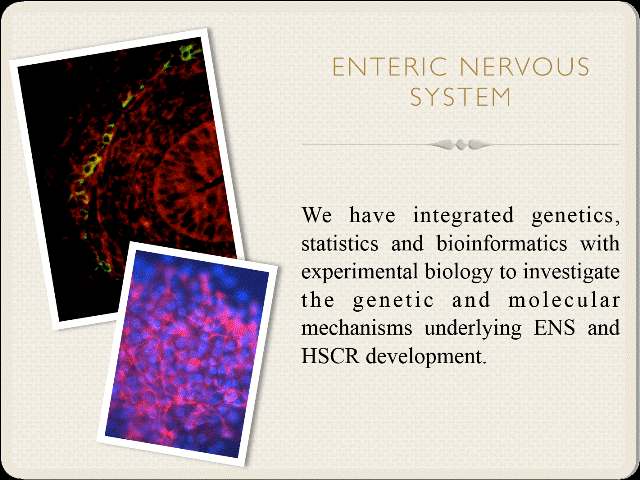Professor Ngan, Elly Sau Wai 顏秀慧
Professor Ngan, Elly Sau Wai 顏秀慧
| Year | Awarding Institution | Qualification |
|---|---|---|
| 1995 | The Hong Kong University of Science and Technology | B.Sc. in Molecular Biology |
| The University of Hong Kong | Ph.D. |
RESEARCH INTEREST:
· Molecular and cellular biology
· Disease modeling
Neural crest cells (NCCs) are highly migratory stem cells, which give rise to the entire peripheral nervous system (PNS), smooth muscle of major blood vessels, cartilage and bone of the face, endocrine cells in the thyroid and adrenal glands and melanocytes of the skin. Hence, defects in NC development in human yield a large array of diseases, accounting for most of the human congenital disorders.
Our group focuses mainly on NC and PNS development, particularly on two common NC associated diseases: Hirschsprung's disease (HSCR; colonic aganglionosis) and neuroblastoma (NB). HSCR is attributed to a failure of enteric NCC to fully colonize the gut, leading to absence of ganglion in the bowel, while NB is the most common childhood solid tumor derived from improperly differentiated NCCs in adrenal glands and sympathetic nervous system.
Enteric nervous system
We have integrated genetics, statistics and bioinformatics with experimental biology to investigate the genetic and molecular mechanisms underlying ENS and HSCR development.
Molecular basis of the enteric nervous system development and Hirschsprung's disease

Enteric nervous system (ENS) in mammals is derived from the enteric NCCs. These precursor cells extensively proliferate to expand, migrate over a long distance to fully colonize the developing gut, and differentiate into millions of neuron and glia which are organized into the network to coordinate the complex behaviors of the gut. Failure of the enteric NCCs to form ganglia in the hindgut may result in HSCR.
We are the first group to demonstrate that Hedgehog (Hh) signaling is implicated in both the maintenance of ENS progenitors and its subsequent lineage commitment, and that abnormal glial differentiation is a novel disease mechanism for HSCR (Ngan et al J Clin Invest. 2011). An important next step is to understand how these Hh signaling molecules regulate the lineage determination of ENCCs and contribute to HSCR susceptibility. By making use of the established single and compound mouse mutants that carry mutations in various Hh signaling components including Sufu, Sox10, Gli2, Gli3, and a new mouse line carrying Gli-reporter, we aim to further decipher the molecular and cellular events underlying this process.
Use patient specific iPSC for studying human NC development and disease etiology for HSCR

Early stages of human gestation are virtually inaccessible for experimental research, making human induced pluriopotent stem cell (iPSC) culture a unique model for studying the development of human NC lineages and the associated diseases. To date, with defined differentiation conditions, iPSC can be dictated to form neural rosettes that comprise cells expressing early neuroectodermal markers. Importantly, in response to appropriate developmental patterning cues, these neuroepithium-like cells are capable of progressing toward different NC lineages and differentiating into varied region-specific neural and non-neural NC derivatives. Currently, we have established a catologue of patient specific iPSC lines and an appriopiate NC models for HSCR disease. By integrating the next-generation sequencing data on the patients, we aim to identify not only the causative genes, but also the molecular pathways implicated in disease pathogenesis.
Neuroblastoma
Implication of neuroblastoma tumor initiating cell in determining tumor behavior

Under the framework of cancer stem cell (CSC) or tumor initiating cell (TIC) hypothesis, cancer cells are hierarchically organized in a tumor bulk. TICs give rise to phenotypically heterogeneous progenies, contributing to the wide range of clinical presentations and non-uniform response to the treatment of NB. Fibromuscular and glial lineage commitment of TIC favors tumor regression and maturation, respectively, whereas differentiation to the neuronal lineage results in a malignant tumor progression. In my laboratory, different NB-TIC lines derived from primary and bone-marrow metastasized tumors have been establised and used to generate in vivo models for understanding NB initiation, growth and progression.
| Awardees | Award Date | Honours / Awards / Prizes | Category |
|---|---|---|---|
| 2011-08-01 | Outstanding Research Paper Award 2011 (Paper title not provided): Department of Surgery, The University of Hong Kong | Research Achievement | |
| 2007-10-01 | The Best Presentation: 12th World Congress on Advances in Oncology and 10th International Symposium on Molecular Medicine, Greece | Research Achievement | |
| 2008-04-01 | International Travel Grant Award: ANR2008, Asian Children's Care League - JAPAN (ACCL), Chiba, Japan | Research Achievement | |
Lau, CST Lai, PL Li, P Lui, NCK Li, Z | 2019-06-01 | Travel Award: ISSCR | Research Achievement |
Lau, CST Lai, PL Lui, NCK | 2018-04-01 | Poster Presentation Award - Human pluripotent stem cell-based human colonic organoids for modeling Hirschsprung disease: The 5th International Symposium on Development of the Enteric Nervous System: Cells, Signals, Genes and Therapy, Boston, U.S.A., 8-11 April 2018 | Research Achievement |
Lee, KY Miao, X | 2008-10-11 | Prokineticin signaling in neuroblastoma: The 3rd National Pediatric Surgical Oncology Conference and the 3rd Cross-strait Symposium on Pediatric Oncology, Shanghai, China, 10-13 October 2008 | Research Achievement |
POON, Hiu Ching | 2007-03-01 | Best Poster Award: Aberrant KLF4 expression and BMP signaling cause proliferation defect in PTC1-/- neural crest cells.: MGH-HKU-Nature China Forum | Research Achievement |
| 2007-10-01 | The Outstanding Award - "Prokineticin signaling in normal growth and tumorigenesis": International Journal of Molecular Medicine ISSN: 1107-3756 ; eISSN: 1791-244X | Research Achievement | |
LI, Zhixin Lau, CST Lai, PL | 2018-04-01 | Poster Presentation Award - GL13 suppresses the early development of human enteric neural crest cells by inducing premature neuronal differentiation: The 5th International Symposium on Development of the Enteric Nervous System: Cells, Signals, Genes and Therapy, Boston, U.S.A., 8-11 April 2018 | Research Achievement |
| Term Period | Position | Professional Societies |
|---|---|---|
| 07/2005-present | Active Member | International Society for Stem Cell Research |
| 07/2006-present | Associate Member | Centre for Cancer Research, University of Hong Kong |
| 07/2004-present | Full Member | Centre for Reproduction, Dvelopment and Growth, University of Hong Kong |
| 11/2007-present | Active Member | America Society for Cancer Research |
Are You Missing Publications, Invited Lectures? Click Me.


